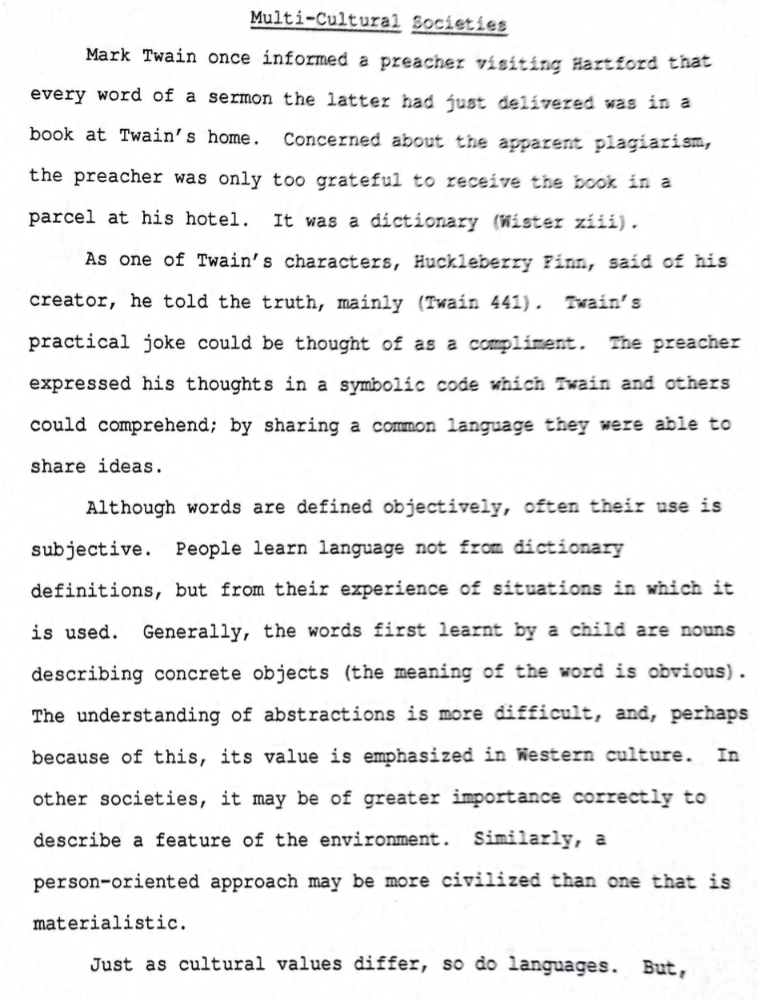Multi-Cultural Societies
Mark Twain once informed a preacher visiting Hartford that every word of a sermon the latter had just delivered was in a book at Twain’s home. Concerned about the apparent plagiarism, the preacher was only too grateful to receive the book in a parcel at his hotel. It was a dictionary (Wister ziii).
As one of Twain’s characters, Huckleberry Finn, said of his creator, he told the truth, mainly (Twain 441). Twain’s practical joke could be thought of as a compliment. The preacher expressed his thoughts in a symbolic code which Twain and others could comprehend; by sharing a common language they were able to share ideas.
Although words are defined objectively, often their use is subjective. People learn language not from dictionary definitions, but from their experience of situations in which it is used. Generally, the words first learnt by a child are nouns describing concrete objects (the meaning of the word is obvious). The understanding of abstractions is more difficult, and, perhaps because of this, its value is emphasized in Western culture. In other societies, it may be of greater importance correctly to describe a feature of the environment. Similarly, a person-oriented approach may be more civilized than one that is materialistic.
Just as cultural values differ, so do languages. But, whereas languages can be translated into other tongues, values remain unaltered. It could be argued, therefore, that true translation is impossible; at best, authenticity is compromised. Ideally, it seems, a language is needed which is common to all.
The modern reality, of different ethnic groups within one society (but speaking different languages and living separate lives), is a problem not only of intolerance, but also of ignorance. It is not enough simply to be aware of differences. They must be understood in terms of the beliefs they represent. This can be achieved only through experience, preferably personal, of that way of life, and its language from which it is inseparable.
That it is the speakers of minority languages who must learn the language of the majority is a matter of practicality. That they should suffer educationally or socially in relation to their peers is due to cultural biases against them, the effects of which often are compounded by financial poverty. But if such minorities were to decide to opt out they would surely become the objects of greater hostility than that which they already face; the difference from the norm which they represent is proportional to the fear and hatred they induce in others. Alternatively, intregration with the mainstream would further dilute their tradition.
It is possible, and it is certainly necessary, to live in a multi-cultural society. But as the differences become greater so do the problems that come with them. In choosing between separation and homogeneity of cultures, people usually do not have the advantage that Huck Finn has: Faced with the prospect of adoption and “sivilization” by Aunt Sally, Huck knows that he must move on, he can’t stand it. But then, he’s been there before (Twain 650).
Works Cited
Twain, M. “The Adventures of Huckleberry Finn.” In The Family Mark Twain. (1988). New York: Dorset Press. pp. 441-650.
Wister, O. “In Homage to Mark Twain.” In The Family Mark Twain. (1988). New York: Dorset Press. pp. xiii-xxiv.
Works Consulted Bloom, A. D. (1987). The Closing of the American Mind. New York: Simon and Schuster.


